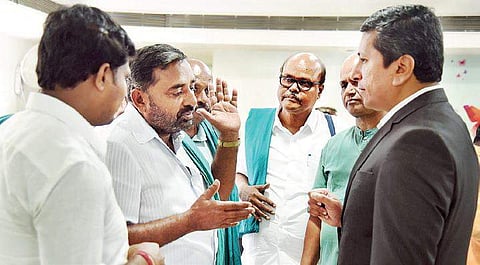

BENGALURU: Tobacco farmers in Karnataka are ready to switch to alternative crops to help cut down tobacco-related diseases, but have set tough conditions before the government. Farmers’ representatives demanded `5 lakh per barn as one-time compensation from the government. Barns are structures where farmers dry and cure tobacco produce before selling to traders or cigarette companies. They cost several lakhs of rupees to build.
They were speaking at a HCG Farmers’ Round Table Meet organised by Antardhwani, a think-tank backed by Healthcare Global Enterprises Ltd (HCG). Senior World Health Organisation officials, environmentalists, health specialists, Karnataka government anti-tobacco officers, tobacco farmers from Mysuru and Hunsur came together to brainstorm on the challenges of an alternative crop.J M Veerasangaiah, Karnataka Rajya Raita Sangha leader, and H Kumar, president of Karnataka Tobacco Farmers, were present. “We haven’t been shown any economically sustainable alternative crop. In Karnataka, 10 lakh families are dependent on this. We’re ready to switch if our demands are met,” Kumar said.
Medical experts said tobacco use has increased the number of cancer patients. Both active and passive users are affected, said Dr B S Ajaikumar, chairman and CEO, HCG.“The earnings to the exchequer are significant but the economic cost of smoking is far greater. We can only quantify the state’s expenditure on cancer and TB, which runs into billions of dollars annually, but what about the young lives snuffed out prematurely? It’s a blow to the economy,” he said.
The growth of tobacco has also impacted the environment, said Ananth Hegde Ashisara, environmentalist and former chairman of the Western Ghats Task Force. “It’s not only citizens but Karnataka’s forests too that are bearing the brunt of tobacco cultivation. Around 7 lakh tonnes of fuel wood is used to cure tobacco, the state loses 300 hectares of forest every year,” he said.
Agreeing that implementing alternative crop farming immediately is difficult, Vineet Munish Gill, National Programme Officer (Tobacco Control), WHO Country Officer, Delhi, said that a recent global audit survey showed that India is the second largest tobacco producing nation, next to China. “India aims to reduce tobacco consumption by 25% by 2025, and with measures like a ban on smoking in public places and several awareness programmes, the use of tobacco has been reduced by 17%.
However, revising awareness on supply side is necessary,” she said. Nayanatara S Nayak, anti-tobacco activist and professor, Centre for Multi-Disciplinary Development Research, Dharwad, said a few farmers have started a pilot project of alternative cropping near Hunsur, and done a tremendous job. “This model could be replicated on other farms too. Farmers have to be willing, and have political backing,” she said.
POSSIBLE SOLUTIONS
Dr US Vishal Rao, head and neck oncologist and member of the High Powered Committee on Tobacco Control, said there is a mafia of illegal tobacco cultivation and sale in Karnataka. “This has to stop. A letter on this was written to the Union government by IAS officer N Shivasailam many years ago. It constitutes 30 per cent of the tobacco market,” he said.
Explaining that the Tobacco Board Act should be changed -- it now says the Board has to promote tobacco -- he said it should look at reduction without affecting farmers. “A phased reduction in tobacco farming has to happen. Annual licences should be reduced, a rehabilitation plan for farmers and complete connectivity market should be provided,” he explained.H R Jayaram, lawyer turned organic farmer, spoke about how farmers can easily shift to organic farming.